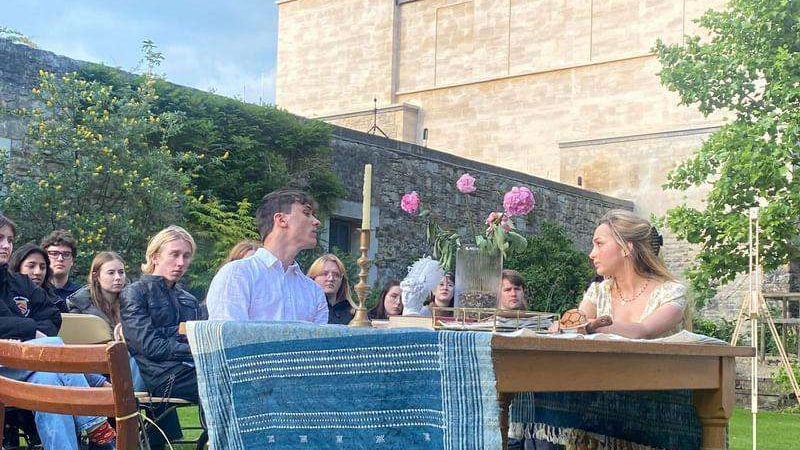“The best prophet of the future is the past” – Byron
In the sweet-preserved garden behind Christ Church Cathedral there stands a table decked with cloth and books and a dark-coloured flower-vase. A sharp but naive 13-year-old and her tutor, both in the dress of 200 years ago, sit at table and discuss the definition of “carnal embrace”. The manner, the accents, the dress and the bearing of the pair is perfectly in tune with their time period; and we the audience, sitting in the gentle green of the garden with the waving of boughs overhead, feel for a moment that this is not merely a play, but an authentic window into an English garden 200 years ago.
The period setting is only one of many attractions in what must be the best play that I have ever seen in Oxford. It is a dual story which takes place in the garden of Sidley Park between the early 19th century and the present day. Some of its weightier themes include chaos theory and the relationship between past and present; but these are enlivened by characters who live and breathe with sharp, often amusing, dialogue; and by an ingeniously structured plot which must be seen to be grasped.
Fittingly, for this year is the bicentenary of his death, Lord Byron plays a significant offstage role. He is an unseen presence without whom the plot would collapse. At risk of exposing the developments of the plot, which has the trappings of the very best kind of historical thriller, I will only say that the poet lives up to his appellation of “mad, bad and dangerous to know”.
So much for the play itself; but this fabulous production by Christ Church Dramatic Society elevates it to heights at which even Tom Stoppard, the playwright, must be astounded. Every one of the characters is performed with the keenest blend of boldness and subtlety; the actors go infinitely further than the script in convincing us that they are human beings rather than the inventions of a playwright.
Catty Claire immerses not only herself but the audience inthe glimmering character of Thomasina Coverly; her sharp-naive attitude, which by a lesser talent would be given the appearance of artifice, comes across here as dazzlingly authentic.
Gilon Fox cuts a vigorous and charismatic figure as Septimus Hodge. Like Byron himself, Mr Fox commands audience attention by the blend of boldness and studied carelessness with which he delivers his lines, and by the tireless energy of his manner.
Alex Still as Bernard Nightingale provides a most convincing view of a very recognisable kind of modern-day intellectual; the character’s bookish charm is matched only by the sharpness of his retorts when he is incensed.
Tia Kwanbock is remarkable in elevating Chloe Coverly, who in the original play is rather a pale character, into a charming and believable human being to whose reappearance the audience constantly looks forward.
Hattie Wellock’s performance, as an aristocrat of the early 19th century, must be called Gissingian for its grasp of 19th-century mores and vivid understanding of character; her command of Lady Croom is absolute (with a first-rate delivery of dialogue) and her presence on stage is captivating.
Amina Poernomo, as the charmingly innocent Valentina Coverly on whom the plot turns, is delightful to watch. She understands the humour of her character although she performs all the same with seriousness and skill. With a bright stage presence, she establishes herself as a most excellent performer.
Conor Tidswell is grand and by turns amusing as Ezra Chater. He possesses, for one thing, the subtle art of wearing period dress instead of being worn by it, and there is certainly a kind of star quality in his bearing. It is a shame that he vanishes after the interval.
Cameron Maiklem’s turn as Captain Brice is a marvellous piece of acting. He gives so much character to his role that it is impossible to think of Captain Brice being played or embodied by anyone else.
The most impressive performance, however, is by Susie Weidmann. As Hannah Jarvis, the academic with an attitude, Ms Weidmann is superb. Her entire attitude – the changes of expression, the reach of her voice, the coolness of gait, even the subtle puffs and flicks at her cigarette – has the rare onstage glow of a living character. Here is an actress for whom the audience now holds great expectations.
It is a shame that the director, Billy Jeffs, gives himself so little to do onstage besides standing around in a tuxedo. His most memorable scene involves a frenetic outburst on the subject of the Emperor Napoleon; and here Mr Jeffs’s comical suddenness was frightening not only for the audience but for a flock of pigeons who had been watching with interest from a nearby tree. The effect was marvellous.
Although his role is only a bit-part, Mr Jeffs’s real talents lie in the art of direction. His mastery of mood and scene and period elevates an already skilful play to one that grips and immerses from start to finish. It is to be hoped that next year he selects another play to which he can bring his keenness of vision and scene. If he can reunite with the same cast, all of whom do such great justice to the characters in this play, then next year’s production could well outstrip this one. Until then, I do not think that there will be a better play to see in Oxford this year.


